Factor frailty into preop assessment
There's no real consensus definition when it comes to assessing frailty perioperatively, but there are risk calculators and risk indices available to help.
Don't overlook frailty when assessing older patients for surgery, but don't necessarily equate frailty with age, Margaret M. Beliveau, MD, FACP, reminded attendees at the Perioperative Medicine precourse at Internal Medicine Meeting 2018.
“You see vigorous and healthy 90-year-olds and you see relatively frail 65-year-olds, and sometimes surgeons in particular overlook frailty during a preoperative assessment,” said Dr. Beliveau, who is an associate professor of medicine and regional dean at Chicago Medical School at the Rosalind Franklin University of Health & Science and a member of the internal medicine residency faculty at the Billings Clinic in Billings, Mont.* She recommended that frailty be assessed preoperatively, along with baseline cognition, risk for delirium, functional status, nutritional status, and, in particular, patients' treatment goals and expectations.
Dr. Beliveau said that she uses the NSQIP (National Surgical Quality Improvement Program) Surgical Risk Calculator to determine surgical risk. The calculator looks at 21 preoperative risk factors and calculates a customized, patient-specific, surgery-specific risk.
“I have to say that I find this quite useful often for educating patients and family about surgical procedures,” she said. “This is a useful tool for some of these very frail older patients … to be able to say, ‘Listen, you are at hugely increased risk of death from this procedure and I don't think it's worth going ahead.’”
When it comes to assessing frailty alone, there's no real consensus definition, Dr. Beliveau said. “It's basically a state of decreased capacity, increased susceptibility to disability because of your age, … and loss of cognitive, social, and psychological function,” she said. Studies of frailty often look at weakness and grip strength, exhaustion, weight loss, and low level of physical activity, but these factors can be hard to measure in clinical practice, Dr. Beliveau noted.
“Most of us, honestly, don't keep those little things that you can test grip strength [with] in your office, or at least it's not part of your preoperative assessment, so this becomes a little bit difficult to manage in the preoperative setting in the office,” she said.
She recommended instead using the Modified Frailty Index, which is culled from a more extensive list. The Modified Frailty Index includes 11 items, each of which is worth 1 point, and the total score is the number of points divided by 11, Dr. Beliveau said. Possible scores range from 0 to 1.
“These are the [factors] that they pulled out as being the most important, and you can see it's mostly history of things that have happened to the patient,” she said. “They do rely on functional status, so partially or totally dependent functional status is important in these patients.”
Dr. Beliveau also discussed some of the available research on frailty and outcomes after surgery. For example, a systematic review on frailty and postoperative outcomes in older surgical patients, published in BMC Geriatrics in 2016, found a strong association between frailty and mortality, complications, and prolonged length of stay in older-old and oldest-old patients.
She noted that it's not known yet whether an association exists between frailty and return to premorbid function, “although I think many of us in our clinical experience would say [if] you have a frail patient who comes in, has some big surgical procedure, they never quite get back to where they were, particularly if it was an emergent surgical procedure.” Dr. Beliveau said that more research is also needed on a possible association between frailty and discharge destination, as well as quality of life.
Being frail is not a contraindication for surgery, but monitoring frail patients carefully after surgery is vital, Dr. Beliveau concluded.
“These are the patients, the hip fracture patient or the total joint patient, they come in, they're frail, they're actually doing pretty well postoperatively … the residents always want to sign off,” she said. “We don't sign off these patients. These patients are at high risk. They need to be monitored closely all through their hospital stay.”





